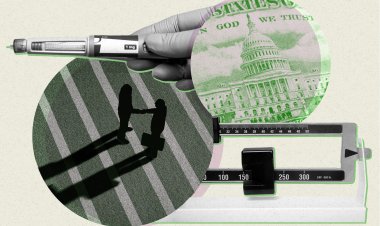Lee Zeldin's Effort to Weaken the EPA Boosts His Political Standing in MAGA Territory
The EPA administrator has gained prominence within the Trump Cabinet through his criticisms of the agency's spending and regulations, yet this stance has left some of his former colleagues puzzled.

Zeldin's aggressive push to revoke over $20 billion in climate grants already allocated has taken the EPA into uncharted waters, generating tension within the Justice Department and leaving some environmental nonprofits worried about potential insolvency. He has made numerous appearances on conservative media platforms like Fox News, Fox Business, and Newsmax, where he has declared the “death of the green new scam” during appearances on Laura Ingraham's primetime show. His calls to roll back "suffocating" regulations and diminish the “climate change religion” also feature prominently in his social media videos on platforms like X and the EPA's YouTube channel.
Expressing admiration for figures like Elon Musk, Zeldin has aligned himself with Trump's proposal to cut 65 percent from the EPA’s budget, claiming such cuts will eliminate waste, revive auto jobs, and enhance U.S. energy independence. The Sierra Club has blasted these budget proposals as “sabotage.”
As a former congressman and Army reservist, Zeldin's role as Trump’s environmental enforcer is garnering praise from the president's base, according to interviews with several of Zeldin’s past colleagues, political rivals, and local officials in Long Island. This praise comes just over two years after Zeldin's vigorous, crime-focused gubernatorial campaign in New York nearly defeated Democrat Kathy Hochul, prompting predictions of a bright future within the Republican Party, possibly as a national or state party chair.
The future implications of Zeldin's position in Trump's Cabinet are now a focal point of interest. “If he can do a good job and continue on the path that he’s on, then there’ll be all kinds of different potential options open to him,” said Andrew Giuliani, who faced Zeldin in the 2022 GOP gubernatorial primary and is the son of a former New York City mayor who also served as a Trump attorney.
Yet, those familiar with Zeldin question the transformation he has undergone. Once recognized as a moderate lawmaker who acknowledged human influence on climate change, he diverges sharply from the Zeldin many once knew. “He’s really turned out to be a chameleon in the political landscape,” noted Adrienne Esposito, executive director of Citizens Campaign for the Environment, a group based in Zeldin’s former congressional district. “He’s always had higher political aspirations, and I believe he has his eyes set on the White House.”
Local environmental groups feel betrayed by Zeldin’s aggressive approach at the EPA. Coastal regions vulnerable to sea-level rise are particularly concerned, especially given Zeldin's prior expressions of support for renewable energy—at odds with Trump’s fossil-fuel-friendly platform. Having been part of both the bipartisan Climate Solutions Caucus and the Conservative Climate Caucus, Zeldin's past advocacy for addressing climate change starkly contrasts with his current actions.
“Honestly, I think he wants to be the next Trump,” Esposito said, emphasizing the dramatic shift in Zeldin's environmental stance.
The EPA did not respond to requests for an interview. However, Zeldin has publicly defined his leadership vision at the agency as “living up to our promises to unleash American energy, lower costs for Americans, revitalize the American auto industry, and work hand-in-hand with our state partners to advance our shared mission.”
In appointing Zeldin, Trump selected a dedicated supporter of his “energy dominance” agenda, a stark contrast to the previous two EPA chiefs during Trump's initial term, Scott Pruitt and Andrew Wheeler, whose tenures involved scandals and regulatory rollbacks without much public engagement.
Republican Senator Kevin Cramer of North Dakota, a close ally of Trump and a member of the Environment and Public Works Committee, admitted that Zeldin's selection surprised even some Republicans. “If you told me, ‘Give me a list of 100 people,’ I probably wouldn’t have come up with Lee Zeldin,” he remarked. “But he’s really bright, and he’s a lawyer, and you need a good lawyer at EPA. He filled the bill perfectly. And he’s pulling it off really well.”
Myron Ebell, who headed Trump’s 2017 EPA transition team, characterized Zeldin as young and ambitious, suggesting he is likely looking to move further up within the Cabinet or become a significant environmental attorney in the private sector. However, he noted that historically, heading the EPA hasn’t served as a stepping stone to higher political office. "In the past, EPA administrator [has] been a dead-end job," Ebell stated.
Zeldin began making headlines shortly after joining the Trump administration, particularly regarding perceived waste in the $20 billion in climate grants that the EPA had allocated to eight nonprofit organizations during Biden’s presidency. These grants, part of the Greenhouse Gas Reduction Fund designed to finance projects in low-income communities, were thought to be secure from Trump's interference, as Congress had allowed the EPA until September 30 to legally commit the funds.
Zeldin, however, has taken steps to reclaim this money, claiming in a video on X that the rapid disbursement was indicative of the Biden administration's awareness of potential wastage. He has also criticized the involvement of former Biden officials in organizations awaiting the grants alongside a supposed lack of EPA oversight.
Despite the ongoing court battles, some nonprofits have decried the administration's actions as illegal roadblocks preventing access to essential funding, jeopardizing their operations. In a recent court session, U.S. District Judge Tanya Chutkan expressed frustration with the Trump administration's failure to provide sufficient evidence to support its claims.
This conflict forms part of Trump’s broader agenda to challenge Biden-era spending that he disagrees with, sidestepping Congress's constitutional authority over budgetary matters. In typical Trump fashion, Zeldin has adopted a catchy phrase to bolster his argument against wasteful expenditure—“gold bars.” This term, initially from a secretly recorded interview with an EPA adviser speaking about the rapid allocation of climate funds, has become a rallying cry for Zeldin.
Zeldin has asserted his determination to reclaim the funds and has utilized his frequent media appearances to amplify this message, clocking at least 22 appearances on Fox News and Fox Business since his nomination. In contrast, he has made fewer appearances on other platforms such as CNN and local channels.
Recently, he posted a video on X announcing the closure of an EPA museum, referring to it as a Biden-era “shrine to environmental justice and climate change.” This bold statement caught the attention of television producer Rob Long, who remarked on a podcast that Zeldin stands out among Cabinet officials. “Write his name down, because he’s going to run for governor, he’s going to run for president, he’s a very ambitious man,” Long suggested.
Zeldin first entered Trump’s circle of influence in 2014, when Trump endorsed his congressional campaign through robocalls before the GOP primary. After Zeldin defeated the Democratic incumbent, Trump publicly took pride in his role in helping Zeldin attain office.
Over the years, Zeldin presented himself as a moderately conservative lawmaker who occasionally supported environmental initiatives. He has voted in favor of bills that compelled the EPA to regulate dangerous chemicals and opposed cuts to programs benefiting clean water.
However, as his alignment with Trump deepened, his stance evolved, culminating in a full endorsement of Trump during the latter's first impeachment trial and a defiant stand against certifying Biden’s victory in 2020. Zeldin's close electoral race in 2022 and his focus on crime and economic issues signaled to many in the party the necessity of aligning more closely with Trump as a pathway to success.
Trump and his allies have noted Zeldin's potential. “People in the Trump camp really liked Zeldin, and how he ran a totally MAGA campaign in New York and almost won,” Ebell said.
By 2024, Zeldin had joined the America First Policy Institute, a conservative think tank closely connected to Trump, and emerged as a key surrogate for his campaign, regularly visiting pivotal states. The joint fundraising committee associated with Trump benefitted from $75,000 from a political action committee Zeldin established after his gubernatorial bid.
After Trump secured the presidency, Zeldin reported being among the first individuals contacted by him. “We were talking about different positions,” Zeldin shared in a February interview, describing Trump as decisive about wanting him as EPA administrator.
Despite his current controversial stances, Zeldin maintains a narrative of past support for environmental issues and collaboration with Democrats. At a conference for environmental regulators, he praised Senate Minority Leader Chuck Schumer and expressed a desire to engage with state leaders, highlighting his previous bipartisan efforts.
Former Congressman Carlos Curbelo, a co-founder of the Climate Solutions Caucus, remarked that Zeldin's recent actions are consistent with the rapid push among Cabinet members to implement Trump's agenda. As Zeldin's plans unfold, experts anticipate more clarity on his environmental policies, particularly concerning the endangerment finding, which he aims to overturn despite previously voting against measures targeting this declaration.
A community leader from Zeldin’s former district expressed concern over his decision-making at the EPA. “I find his actions as a congressman aren’t the same actions he’s taking now,” said Paul Pontieri, the mayor of Patchogue, reflecting on Zeldin’s earlier environmental positions.
Overall, Zeldin’s trajectory presents a complex blend of political ambition and the pursuit of ideological alignment within the evolving landscape of the Republican Party.As Zeldin continues to navigate his role within the Trump administration, questions remain about how his actions will impact both environmental policy and his political future. Observers speculate that his decisions at the EPA could influence not just the immediate environmental landscape but also set a tone for how future Republican leaders engage with climate issues.
Critics of Zeldin argue that his current path not only undermines environmental protections but also puts long-term economic and community health at risk. They warn that abandoning ambitious climate efforts may set back progress on combating climate change, especially in regions like Long Island that are acutely vulnerable to environmental changes.
Bob DeLuca, president of the Group for the East End, expressed his disillusionment with Zeldin's transformation, emphasizing, “His former positions are entirely at odds with the slew of environmental rollbacks Zeldin has championed as EPA administrator.” DeLuca’s concerns highlight a broader sentiment among environmentalists that even Republican leaders who once acknowledged climate change are now aligning themselves with a more extreme anti-regulatory agenda.
Moreover, there is an ongoing concern about the ramifications of Zeldin's push to overturn the EPA's endangerment finding. The finding provides a critical legal foundation for many of the agency's regulations aimed at reducing carbon emissions from vehicles and power plants, which have long been seen as fundamental steps in addressing climate change. If Zeldin succeeds in dismantling this underpinning, it could effectively open the floodgates for industries to emit greenhouse gases without stringent regulatory oversight.
Republicans, particularly those who might share Zeldin's earlier views on climate policy, are watching closely. They wonder how his aggressive stance will resonate within the party and among the broader electorate. Former Rep. Carlos Curbelo echoed this sentiment, observing, “I know that he understands climate science and I know that he understands that the agency has a role in addressing all of that. But if this is some kind of radical change that's going to essentially put us in a position where we’re ignoring this reality, then that would be concerning.”
As Zeldin’s tenure progresses, there are indications that he may continue to tout his past bipartisan initiatives while simultaneously enacting policies that align with Trump's MAGA base. This duality reflects a broader trend within the GOP, where environmental issues have increasingly become polarized, with a focus on economic argumentation rather than scientific consensus.
Political analysts are also keenly observing whether Zeldin's leadership style will leave room for collaboration or if it will be marked by a drive to enact a sweeping rollback of regulations with minimal input from opponents. The balance of maintaining party loyalty while managing stakeholder relationships in a complex and polarized environment will be crucial to navigating his role effectively.
As potential future ambitions linger, the question of whether Zeldin will run for higher office remains a captivating narrative. With Trump leading the charge in Republican circles and a growing trend toward populist rhetoric, Zeldin's next moves will be indicative of his commitment to this evolving political landscape.
His supporters will be looking for results on his ambitious policy agenda at the EPA, assessing if he can deliver meaningful achievements that align with Trump’s broader economic goals without completely alienating centrist Republicans and independents who may be more supportive of sustainable environmental policies.
The upcoming months will likely prove pivotal for Zeldin, both as he contends with the operational challenges of running the EPA and as he carves out his identity within the Trump administration while laying groundwork for potential future aspirations. Observers expect that Zeldin will need to keep a keen eye on public perception regarding environmental responsibility, particularly as climate events increasingly dominate headlines and public consciousness.
Ultimately, Lee Zeldin's leadership at the EPA embodies a microcosm of the broader struggles within the Republican Party as it grapples with defining its identity in an era of intense political division. The interplay between his actions, public sentiment, and party dynamics will be closely watched as they unfold in the months and years ahead, potentially shaping the future of Republican environmental policy and Zeldin's own political trajectory.
Anna Muller for TROIB News
Find more stories on the environment and climate change on TROIB/Planet Health












